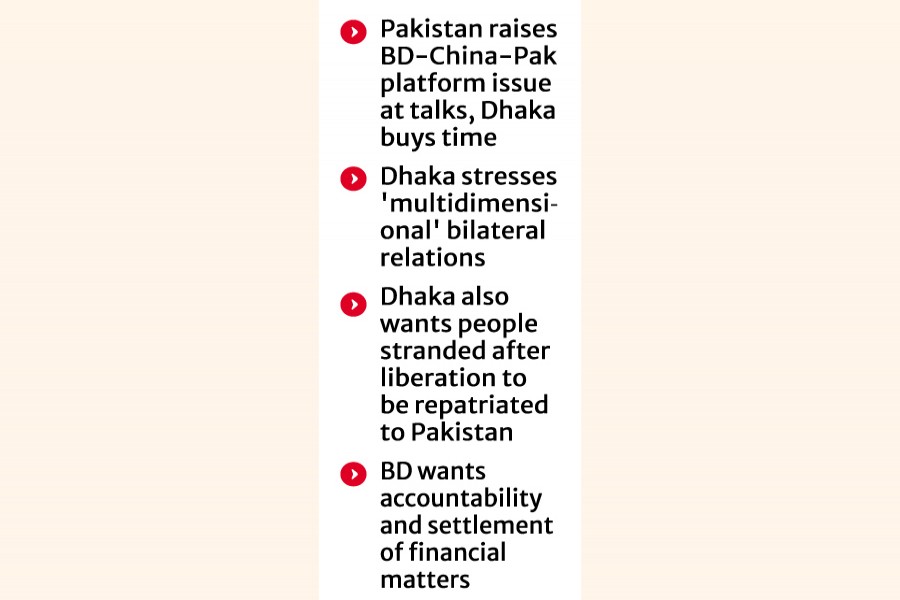
Published :
Updated :

Bangladesh and Pakistan agree to move forward strengthening previously strained bilateral relations as the two countries Sunday signed six instruments of cooperation following talks in Dhaka.
At the same time, the two sides have also agreed to continue discussions on unresolved issues-dating back Bangladesh's liberation from Pakistani rule in 1971.
Foreign Affairs Adviser of the post-uprising Bangladesh government Md. Touhid Hossain apprised the press of the developments after official talks where he led the host side while visiting Pakistan Foreign Minister Ishaq Dar led his country.
At the talks that also covered regional cooperation and international issues of common concern, Bangladesh called on Pakistan to apologise for the "genocide" committed in 1971.
Speaking at a solo press briefing after the meeting with the Pakistan Foreign Minister, Ishaq Dar, who is also deputy prime minister of his country, the adviser told journalists, "We emphasised the importance of expanding multidimensional relations between the two countries, particularly in trade and investment, which will directly benefit the country and its people."
Bangladesh wants accountability and settlement of financial matters. "We want them to express regret and apologise for the genocide that took place here. We also want them to take back those stranded people."
The Pakistani foreign minister claimed that "the 1971 issue was resolved in 1974 and 2002". When asked about Bangladesh's position, the adviser responded, "I certainly do not agree. If we had agreed, it would have been resolved in their way."
Md Touhid Hossain said, "We presented our respective positions. I can assure you this much: there is a matter under discussion that you could consider progress. We presented our position on three points."
He added, "Both sides have agreed that these issues need to be resolved, and to move bilateral relations forward smoothly, they need to be put behind us. We agreed to continue discussions and try to address these matters in a way that allows us to eventually move past them."
Asked whether Pakistan agrees to an unconditional apology, the adviser said, "You cannot put words in my mouth. What I can say is that we explained our respective positions. The only progress is that I believe we agreed it is necessary to discuss and resolve these issues so they do not remain obstacles in our relationship."
Referring to the unresolved issues between the two nations, he said, "We discussed these matters and agreed that we will continue to talk about them and try to resolve them in the future-these will not be settled in a day. We agreed to approach them in a way that allows us to eventually put them behind us."
He adds: the bilateral meeting between the two countries was held in a cordial, constructive, and friendly atmosphere. "Our relationship with Pakistan is historical and multidimensional. In this context, during today's meeting, the Pakistani Foreign Minister and I expressed our commitment to further advancing our existing relations in the coming days."
Following Sunday's meeting, six documents of cooperation were signed. One is an agreement and five are memorandums of understanding (MoUs).
The agreement exempts diplomats and government officials of visas for visit to and fro the two countries.
The MoUs cover (I) establishment of a joint working group between the two countries' commerce ministries (II) cultural cooperation (III) cooperation between the foreign-service academies of both countries IV) cooperation between the Bangladesh Institute of International and Strategic Studies and Pakistan's Institute of Strategic Studies (V) exchanges between Bangladesh Sangbad Sangstha (BSS) and Pakistan's national news agency.
The two countries held sector-specific discussions on cooperation in areas that include health, trade expansion, trade balance, market access, textiles, information technology, energy, agriculture and fisheries cooperation, connectivity, shipping, aviation, education and scholarships, cultural and sports exchanges, among others.
Regional cooperation, including matters related to the long-dormant SAARC, also came up for discussion. On ongoing violence in the Middle East and Gaza, the two countries share similar positions.
Bangladesh sought Pakistan's support in resolving the Rohingya crisis.
Asked about the proposed tripartite mechanism-which surfaced in the wake of current waves geopolitical realignments principally centering around trade and tariff--he noted that both China and Pakistan are interested in a Dhaka-Islamabad-Beijing mechanism of interaction.
The foreign affairs adviser said, "We mentioned that not exactly in this format, but that they could broaden it further. They could involve more countries, and we could sit together. Our position on this remains the same, and they have taken it into consideration. It may happen in the future."
He notes that relations with Pakistan were "deliberately kept on hold during the previous government. We want normal relations with Pakistan, just as we want with other friendly nations."
mirmostafiz@yahoo.com


 For all latest news, follow The Financial Express Google News channel.
For all latest news, follow The Financial Express Google News channel.